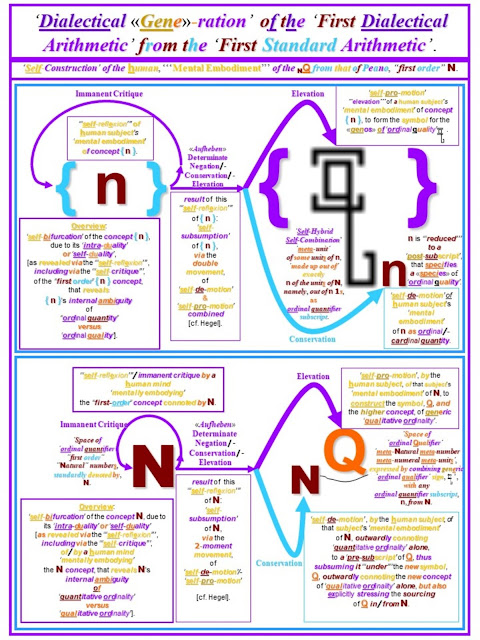Dear Reader,
The second
axioms-system in the Seldonian ‘‘‘meta-systematic’’’ method of presentation of
the progression of the axioms-systems of the Seldonian arithmetics / algebras
of dialectics, named NQ_, is the simplest, most
abstract, and least determinate -- in its expressive, descriptive capabilities
-- of all of the explicitly dialectical axioms-systems of
arithmetic / algebra in that systems-progression.
This does not mean, however, that the NQ_
system is the least useful
system in that progression.
It does not mean that one of the more
advanced dialectical-ideographic languages in that languages-progression is
always, in every case, to be preferred as the language in which to formulate
problems and in which to discover their solutions.
On the contrary,
the NQ_
system is perhaps the most
generally / universally useful of all of the systems in that
systems-progression -- and the most likely best place to start, for
‘heuristic-algorithmic’ support -- in the formulation of problems and the
search for their solutions.
¿Why?
¡Precisely because of its very
simplicity!
That abstractness
and simplicity gives NQ_ its methodological power, its power as a heuristic tool, because that abstractness
and simplicity facilitates scientific
idealization.
Most of the
details, complications, and potential distractions that threaten to derail a
more -- and a “too soon” -- determinate [but therefore also more “chaotic”, in the sense of Marx] description
of a problem, and not even expressible
in the language of the NQ_.
Descriptions of an
“external environment” of the central ‘‘‘eventities’’’ [beginning, of course,
with the ‘arché eventity’] to be dialectically modeled, and of that
environment’s interactions with / actions upon, those ‘‘‘eventities’’’;
descriptions of the physical spatiality of those ‘‘‘eventities’’’, and even of
their detailed
temporality -- all of these details must, at first, be stripped away, in an NQ_
formulation of a problem, or of a presentation.
All that remains,
after that “stripping away”, is a single, kind-of-being ‘arché category’, and the ‘meta-genealogy’ that proceeds out of it through the advancement of an abstracted -- minimal -- form of
temporality: ‘temporal ordinality’.
Regards,
Miguel







No comments:
Post a Comment